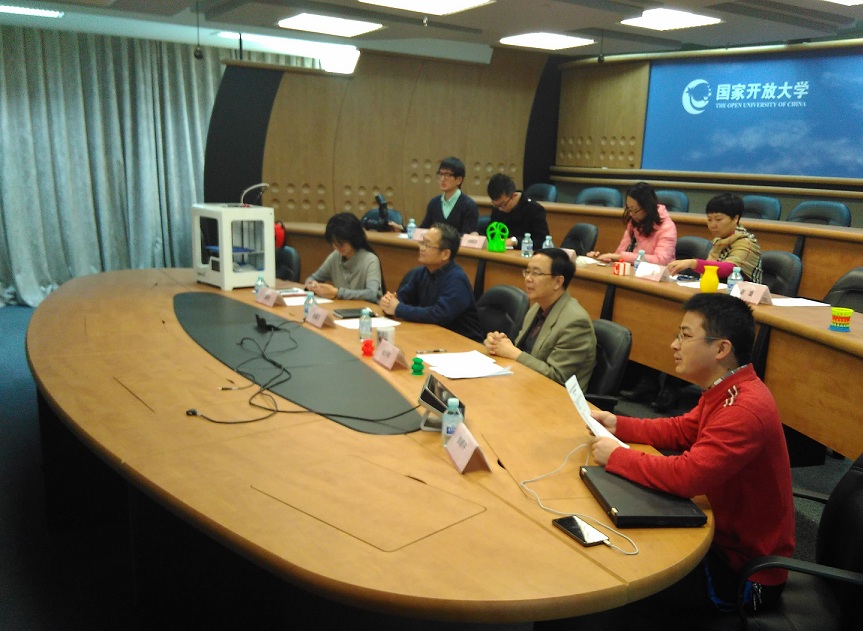 On the morning of November 23, 2015, an event marking the OUC’s donation of 3D printing equipment to Tibet’s Changdu Prefecture and the conclusion of the Guidance Conference on Changdu’s "Four Modernizations" (video conference) was held in the OUC’s cloud classroom.
On the morning of November 23, 2015, an event marking the OUC’s donation of 3D printing equipment to Tibet’s Changdu Prefecture and the conclusion of the Guidance Conference on Changdu’s "Four Modernizations" (video conference) was held in the OUC’s cloud classroom.

 Zhang Shaogang, Vice President of the OUC, and researcher and host of the 2012 key pedagogy projects included in the national social science fund, under the topic of Research on Rural Educational Development and Reform During the Advancement of Industrialization, Digitization, Urbanization, and Agricultural Modernization (the approved project number: AGA120007), provided guidance on the conclusion of the project with Tibet's Changdu Prefecture. He praised the work done by the team, and offered suggestions for follow-up research and local education teaching development. Deputy Director of Changdu Education (Sports) Bureau Da Ga introduced the Changdu’s geopolitical and economic situation, its faulty strength, its enrollment situation, the communication between the OUC and Changdu municipal online video, and the achievements made by the tutors and the technical staff through video training. Entrusted by the OUC, Da Ga has donated three 3D printers to three secondary and primary schools for new technology application training. Zhou Guoxi, Director of the Education and Science Division of Changdu Education (Sport) Bureau, is a cadre sent to support Tibet. Since August 2015, the local video conference room has been connected to one district and 10 counties in Changdu Prefecture, carrying out online video research across the city. "This kind of learning pattern is popular across the Tibetan plateau. For us, research is not limited to 3D printing, but also expanding the training research achievements," Zhou Guoxi said.
Zhang Shaogang, Vice President of the OUC, and researcher and host of the 2012 key pedagogy projects included in the national social science fund, under the topic of Research on Rural Educational Development and Reform During the Advancement of Industrialization, Digitization, Urbanization, and Agricultural Modernization (the approved project number: AGA120007), provided guidance on the conclusion of the project with Tibet's Changdu Prefecture. He praised the work done by the team, and offered suggestions for follow-up research and local education teaching development. Deputy Director of Changdu Education (Sports) Bureau Da Ga introduced the Changdu’s geopolitical and economic situation, its faulty strength, its enrollment situation, the communication between the OUC and Changdu municipal online video, and the achievements made by the tutors and the technical staff through video training. Entrusted by the OUC, Da Ga has donated three 3D printers to three secondary and primary schools for new technology application training. Zhou Guoxi, Director of the Education and Science Division of Changdu Education (Sport) Bureau, is a cadre sent to support Tibet. Since August 2015, the local video conference room has been connected to one district and 10 counties in Changdu Prefecture, carrying out online video research across the city. "This kind of learning pattern is popular across the Tibetan plateau. For us, research is not limited to 3D printing, but also expanding the training research achievements," Zhou Guoxi said.
As early as the 1970s, the central government attached great importance to supportingTibet. However, due to historical and geographical disadvantages, education resource allocation has not always been able to adapt to social progress. In addition, insufficient emerging technologies in education and a lack of training for professional teachers also hinder the development of education in Tibetan areas. Changdu Prefecture is located in the northeastern part of the Tibet Autonomous Region. It is located along the Hengduan Mountain and Sanjiang basin, so its geographical position is both critically dangerous and strategically important. It takes at least three days to drive to Lhasa from the city and education is particularly underdeveloped.
In order to improve this situation, in summer 2014, the OUC created a distance video connection with the Education and Science Division of the Education (Sports) Bureau of Changdu. The Information Technology Department of the OUC has conducted a series of new technology education application distance training sessions for IT teachers in primary and secondary schools in Changdu Prefecture, as well as for the cadres sent to support Tibet. These trainings include "video attachment, by the national Open University information technology of the prefecture of Tibet (engineering centre) for primary and middle school information technology teachers and Tibetan cadres "new technique education" series of remote training, including "3D printing technology and its application in education". The Changdu teaching site, built with the support of the OUC cloud classroom, was established in September 2015. So far, five teaching sites have been covered by the cloud classroom. The Changdu cloud classroom teaching sites provide powerful IT support for social training. This is an important part of the rural education digitization project prepared by the OUC, and also one of the key measures and key projects in support of Tibet for the 12th five-year and 13th five-year plans.
Director of the News Centre of the OUC Sun Fuwan and Deputy Director of the Technology Department (Research and Development Centre for Digital Learning) Wei Shunping, Manager of Qingdao Aodelai 3D Printing (partner in donating 3D printers to three schools in Tibet) Han Xueqiang, and representatives of the institutions who accepted the donation, attended the meeting
By Wei Shunping and Zhang Jianchen, OUC